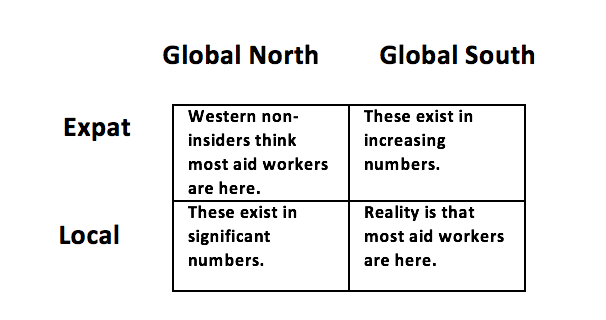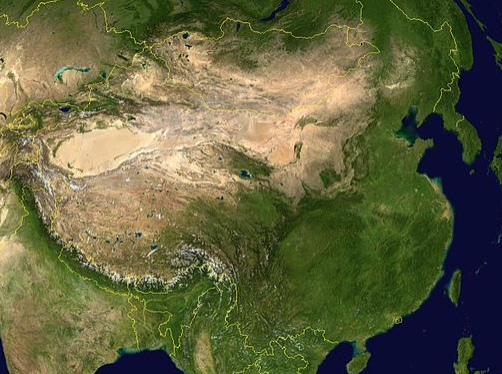“…today’s expat aid worker can be from anywhere and go to anywhere.”
-J (Evil Genius)
Addressing the binary illusion of ‘expat vs local’ aid workers
False binary
Very simple message here.
Bluntly put, the ‘expat versus local’ narrative perpetuates a sloppy false binary. In order to articulate our understanding of the world we all tend to shorthand toward generalizations that make sense in terms of our lived experience, most of the time unconsciously so. We see and understand the world around us through the lens of our most recent experiences which most times are in a somewhat fixed in location. Even the most learned among us default to overreachingly broad comments to make a point.
Color me guilty as well.

One antidote for this tendency was described in the mid-20th century by C. Wright Mills, an American sociologist who coined the phrase “the sociological imagination.” Using this tool, one habitually takes the broadest appropriate view of issues both temporally and geographically. But the danger here is literally TMI, ‘too much information’ and thus tends to handcuff the thinker with ‘the paralysis of analysis.’
As discussions about the status of all aid and development workers moves forward we can do well to clarify our talking points, definitions, and points of view. This, and ask some hard questions.
‘Tales of hunting’
That the narrative driving much (most?) discourse in the sector -including the ‘expat  v local’ is dominated by
v local’ is dominated by
a global north, largely white and relatively privledged population seems apparent.
That said, this is being written by a global north, relatively privileged white male, so it could be argued that my perspective is inherently biased as well. Neither Mills nor I can defend that barb except to say that as much as sociology is a science and scientific knowledge is transcendent then, yes, with effort, objectivity, and clarity our observations can be viewed as useful. But I digress.
As an aside, if someone responds that “all [aid worker] lives matter” are they are saying, in effect, “all lives matter”, and do we really want to go there?
Clarifying observations?
Of the hundreds of thousands around the globe right now doing what can be called aid and development work (and yes, I know I am driving some readers crazy inferring the two are conflated), there are many who defy easy categorization. J (Evil Genius), points out that,
“Much of the local (and international) angst about expats seems to be grounded in some outdated (and often also ethnocentric) assumptions about who the expats are and where they’re from. When @TMSruge (low-hanging fruit example) rants on about expats in Africa, he’s not talking about the gazillion Chinese, nor is he talking about all the Filipinos, nor is he talking about all the Kenyans in Uganda, or all the Ugandans in South Africa, or all the South Africans in Mali. He’s talking about the white dudes (and to a lesser extent, white women because they seem to do more selfies)….”
What percentages of all aid and development workers from the global north fall onto one of the following three buckets:
- Those exclusively doing work in their home country.
- Those who work mostly outside of their home country.
- Those who work exclusively outside of their home country.
Same question, but what percentages of those from the global south fall into each of those buckets?
Here is a simple 2×2 table illustrating my views on the perception versus reality regarding aid workers.
 As J (quoted above) goes on to point out, any discussion of ‘expats versus locals’ “needs to be nuanced around the fact that today’s expat aid worker can be from anywhere and go to anywhere.” He goes on to say “… it needs to be further nuanced around the motivations and expectations of the various categories and sub-categories within the very broad “expat.” I suspect (this would be an amazing question to study… 😉 😉 ) that the reasons white Western people go into international aid work is different from the reasons all the Kenyans, Congolese, Zimbabweans, and Ugandans do. Which are probably different still from the reasons why Japanese, Singaporeans, and Sri Lankans so…”
As J (quoted above) goes on to point out, any discussion of ‘expats versus locals’ “needs to be nuanced around the fact that today’s expat aid worker can be from anywhere and go to anywhere.” He goes on to say “… it needs to be further nuanced around the motivations and expectations of the various categories and sub-categories within the very broad “expat.” I suspect (this would be an amazing question to study… 😉 😉 ) that the reasons white Western people go into international aid work is different from the reasons all the Kenyans, Congolese, Zimbabweans, and Ugandans do. Which are probably different still from the reasons why Japanese, Singaporeans, and Sri Lankans so…”
I hear that J is working on a non-fiction book tentatively titled “Expat” and I look forward to learning from his well thought out insights that, I suspect, would make C.Wright Mills proud. As someone who has ‘been there, done that’ more than most, I know he has a wide angle perspective worth a read.
Another false binary
That the convenient ‘global north/global south’ distinction is also a false binary complicates our analysis further. Certainly the ‘gazillion Chinese’ mentioned above stress this distinction. One consideration is that most nations are not ‘one nation’ in many senses. Though from the outside China might be painted as a monolithic whole, the differences between the perceptions, actions, and agency of the elites in Shanghai or Beijing and the rural poor in the Xinjiang region are stark and significant.
further. Certainly the ‘gazillion Chinese’ mentioned above stress this distinction. One consideration is that most nations are not ‘one nation’ in many senses. Though from the outside China might be painted as a monolithic whole, the differences between the perceptions, actions, and agency of the elites in Shanghai or Beijing and the rural poor in the Xinjiang region are stark and significant.
To even further deepen the discussion one aid worker pointed out that “…in my experience, those that are ‘local aid workers’ don’t necessarily know that they’re working in aid.” She makes a good point and raises the question as to how all aid workers see themselves in terms of the ‘expat/local’ and ‘North/South’ taxonomy. My guess is that a massive number would reject such simplistic and narrow pigeon holes. Perhaps we -yours truly included- should as well.
Semantics
Above I have addressed both the ‘expat vs. local’ and the ‘Global North vs. Global South’ issues in a way that I hope will raise even more questions and offer a small ray of light. Clarifying what we are talking about -and then talking about the same thing with each other- is productive, and perhaps some of the above moves us in that direction. For my part I will continue researching and reporting aid worker voices in general and more specifically on the whole topic of ‘ localization’, whatever that means.
Have a link you recommend that I look at, a reading suggestion, or comments in general? Contact me.


 Follow
Follow